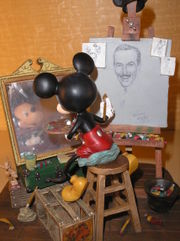Friday, November 30
A Diving Bell and Butterfly Anoint US with Holiday Gratitude
 During a trip this past spring, I read a short book to a friend as she drove the scenic back roads, thoroughfares author William Least Heat Moon calls America's "Blue Highways."
During a trip this past spring, I read a short book to a friend as she drove the scenic back roads, thoroughfares author William Least Heat Moon calls America's "Blue Highways."In an email today informing me the book is now a movie opening today in "select theaters," she characterized my reading of The Diving Bell and the Butterfly as "a wonderful memory that I will treasure for the rest of this life."
Indeed, the 144-page memoir is an edifying read, a literary effort that can--if you carry its stark treasures with you throughout the Holiday Season--rev up your year-ending gratitude. With the proper turn of head, you also will discover--or recall--that more innocent United States Least Heat Moon was seeking when he undertook his 4-month, 13,000 Blue Highways driving odyssey across the country: "an America stripped of the commercial fog and tabloid mentality." Though you may have to dig a little, it's still out there, lurking beneath all the muckity muck.
Dictated in Morse code with his left eye by the newly head-to-toe paraplegic and editor of the French magazine Elle, the book that Jean-Dominique Bauby, 43, left us is understandably austere, void of self-pity and celebratory of a refined intellect trapped inside a body no longer serving his simplest wants; Baudy senses, too, the life left him may be slowing ebbing from him.
Below is MTV's 30 November reveiw of The Diving Bell and the Butterfly.
The Diving Bell And The Butterfly': Buried Alive, By Kurt Loder
Director Julian Schnabel brings a narrow emotional focus to this tale of a man trapped inside his own body.
"The Diving Bell and the Butterfly" tells a true story so dreadful that, as it painfully unfolds, you may find yourself counting your blessings in bushels. In December of 1995, Jean-Dominique Bauby, the 43-year-old editor of French Elle magazine, suffered a massive stroke that left him paralyzed from head to toe — with the exception of his left eye, which he was still able to blink. The movie is a tribute not so much to the human spirit as to Bauby's indomitable journalistic will: Using his one blinking eye, he was able to dictate a 144-page memoir, a book that became a best-seller in France and is now the basis of this picture (which is in French, with English subtitles).A film about a man who can't move or express feeling in his face (a grotesquely twisted mask with one bulging, bloodshot eye peering out) doesn't sound like something a lot of people would want to sit through. But director Julian Schnabel has organized the story with graceful economy. The pace never lags, and he consistently steers it away from the overplayed pathos that a lesser filmmaker might have embraced. Bauby's horrific situation, and the purposefully muted reactions of the people around him (who feel a reflexive guilt in their own good health), speak for themselves with spare eloquence.
The movie begins in darkness, opening into blurry light as Bauby (Mathieu Amalric) emerges from a coma and slowly realizes that not only is he in a hospital, but that no one can hear the words he thinks he's uttering. (We hear his thoughts in voice-over.) A doctor delicately explains that he has had a "cerebrovascular accident," and is now incapacitated by "locked-in syndrome" — he can no longer move, speak or even swallow. A speech therapist named Henriette (played with welcome, breezy charm by Marie-Josée Croze) arrives to undertake whatever rehabilitation may be possible. Equipped with a card bearing an alphabet of letters arranged according to the frequency of their use in the French vocabulary, she teaches Bauby how to employ eye-blinks — one for yes, two for no — to select a letter as it's spoken aloud in order to construct words, then sentences and ultimately, over the course of a year, his book. The process is exceedingly laborious, but Schnabel turns the steady, murmuring repetitions of the letters into an incantatory device that pulses hypnotically throughout the film.
There are two key women in Bauby's life. When one of them, Céline (Emmanuelle Seigner), arrives in his hospital room to visit, and a doctor announces, "Your wife is here," we're startled by Bauby's cold interior objection: "She's not my wife; she's the mother of my children." He truly longs to see Inés, the woman for whom he left Céline. But Inés doesn't come. In the movie's most wrenching scene, she calls instead, and Céline, sitting devotedly by Bauby's bedside, picks up the phone. Resigned to this other woman's importance in Bauby's life, Céline puts the call on speakerphone, and Bauby listens as Inés self-servingly tells him she simply can't bear to see him in his diminished state. When she asks if Bauby has any response, he blinks out a message: "Each day I wait for you." Breaking down in tears, Céline dutifully communicates the hateful words.
Bauby has been physically reduced to little more than an object — patiently bathed like an infant, propped in a wheelchair to be maneuvered out onto a lonely veranda. In a recurrent image, he sees himself floating deep underwater in a helmeted diving suit, cut adrift into awful isolation. (The movie's title is an inexact translation from the French; there are no diving bells in the movie.) Deep in his mind, though, Bauby is still free ("I can imagine anything"), and we travel with him through a procession of memories: the sun-bathed sands of Martinique, a golden-toned sexual encounter, a skiing vacation with friends in whose lives he'll no longer figure. When he recalls the Parisian celebrity he once enjoyed — a professional world filled with fashion models, photo shoots, loud rock music and endless luxury — we wince at his devastation: "Words can't express the grief that engulfs me."
Schnabel delivers us from the prison of Bauby's flesh with intermittent flashback sequences, some of them illuminating (the scenes with his anguished father, played by Max von Sydow), others more oblique (a strange recollection of a visit to the shrine town of Lourdes with an annoying girlfriend). There are also brief fantasy interludes. Some are inventively amusing (a clowning Marlon Brando pops up in one of them); but when Bauby hears that Nijinsky might once have visited the place where he is now confined, we wonder whether it was necessary to show us the great dancer leaping down a hospital corridor.
The picture is artfully executed, but its rigorous design creates an emotional void. Schnabel's determination not to milk the story for rote sentimentality is admirable, but the movie's blunt conclusion (Bauby died of pneumonia in March of 1997, just days after the publication of his book) is nevertheless unsatisfying. Bauby's sudden absence has the effect of diminishing his narrative stature, especially since the man we've come to know, although a marvel of fortitude, could also be egocentric and cruelly insensitive. The film's conception allows his story no larger spiritual resonance, so when this singular, difficult character goes away, there's not much left to miss.
Check out everything we've got on "The Diving Bell and the Butterfly."











